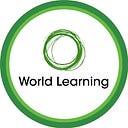10 years and beyond: How an English language teaching certificate continues to inspire and connect
By Eric House
An alumna shares her story of how the certificate has impacted her career.
The Professional Certificate in English Language Teaching (PCELT), an annual 120-hour professional development certificate for current and aspiring English language teachers in the Middle East and North Africa (MENA) region, recently celebrated its 10 year anniversary. The certificate was developed by World Learning and is administered in partnership with Amideast, an international education and training organization in the region.
PCELT was once an idea for Amideast to model the SIT TESOL certificate, an English teaching program with training and certification administered by World Learning. The SIT TESOL certificate curriculum has been adopted by aspiring and current English language trainers around the world through partner organizations and U.S. embassies. Amideast identified an opportunity to do the same exclusively for the MENA region, resulting in PCELT.
Much like the SIT TESOL certificate, PCELT is grounded in experiential learning and reflective practice. Through culturally-specific lessons and workshops emphasizing both theory and practice, PCELT participants can draw from their own experiences in the classroom to deliver relevant, impactful lessons to their learners.
Silvia Nassar is just one of many PCELT alumni who completed the program and went on to dedicate her career to teaching English and supporting the professional development of her fellow teachers.
When she pursued PCELT, Nassar was already an English language teacher and had taken many professional development courses but was looking for additional opportunities to enhance her teaching skills. She was drawn to the PCELT program for its academic rigor.
“I wanted to learn more and develop myself as an educator,” she said. “I was seeking support and guidance when I learned about PCELT. I took the first step towards a journey that’s still impacting me as an educator.”
Nassar described PCELT as an engaging, active learning experience that enriched and strengthened her knowledge and skills alongside a community of her fellow practitioners. “I felt that we were a family,” she said. “We spent a great time together learning and collaborating.”
Learning the theories and frameworks behind every lesson plan and activity — directly placing theory into practice — bolstered Nassar’s confidence as a teacher.
“PCELT allowed me to learn from my experience and that of my fellow colleagues through practical teachings,” she said. As a result, “I started feeling more confident in teaching English as a foreign language.”
Nassar also stressed that the reflection portion of the program was essential. “We would think deeply and critically about each of our practices and discuss them in-depth.”
Being at the center of the learning process inspired Nassar. By the end of the program, she was empowered to dream of even bigger goals.
After completing PCELT in 2014, Nassar went on to receive a master’s degree in teaching English as a foreign language (TEFL) from Birzeit University in 2019 and is now pursuing her PhD at the University of Exeter. Her research focuses on professional development programs for EFL teachers in Palestine, an experience that she knows first-hand.
In 2016, Nassar had yet another opportunity to develop professionally in association with World Learning. In connection to World Learning’s USAID-funded project called the Master’s Scholarship Program for West Bank and Gaza, Nassar was approached through her network to help establish the Palestinian English Language Teachers’ Association (PELTA). The goal was to form an independent, grassroots association — by teachers for teachers. Nassar immediately joined, believing it to be a place for her to support her colleagues in the ESL and EFL community.
PCELT inspired and motivated me to move on to continue developing my skills and knowledge to be able to provide more for my learners and to make myself more useful in my community.
Nassar developed PELTA alongside other Palestinian EFL teachers under the guidance of teacher-trainers like Dr. Kara McBride, currently a senior education specialist at World Learning, and Josephine Clark Kennedy, who went on to be the regional director for English language programs at Amideast. Nassar described that process as one of the most enjoyable experiences of her life.
“Despite all the obstacles and challenges that faced my colleagues and me from different geographical cities in Palestine, we were able to launch [PELTA] in six cities in a short period of time,” she said. PELTA saw immediate interest in teachers looking for opportunities to exchange ideas, experiences, and practices with each other. Nassar believes that what kept PELTA going at the time was the enthusiasm and commitment of the founding members.
Due to shifting priorities and the COVID-19 pandemic, the original PELTA program now solely operates in Ramallah led by Nassar and two other women educators.
Despite the changes in PELTA, Nassar is proud to have taken her experience in professional development programs like PCELT to form a group for like-minded educators in Palestine. “I am grateful to World Learning and Amideast for supporting the establishment and launching of PELTA,” she said.
By adapting the SIT TESOL curriculum in the MENA region, over 10 years of impactful education for English language teachers have occurred through PCELT. If Silvia Nassar’s career is any indication, the strength of the curriculum’s dedication to building passionate individuals ensures a powerful cascading impact.
“I want to be able to help other EFL teachers in Palestine advance in their careers and develop their knowledge, skills, and practices,” she said. “I want them to find a place that promotes their growth and updates their skills and knowledge within a community that fosters positive development.
“PCELT inspired and motivated me to move on to continue developing my skills and knowledge to be able to provide more for my learners and to make myself more useful in my community.”
